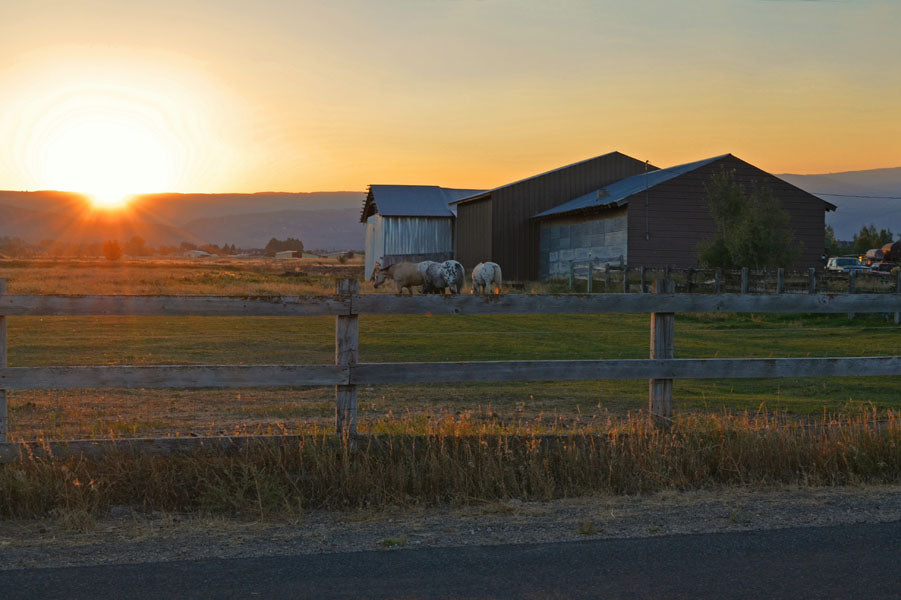
In the beginning, God cursed the ground. It’s been an uphill battle for humanity ever since. Indeed, we have discovered that only by the sweat of our brow may we eat bread. In addition to food, the earth produces weeds and pests that compete with our bounty. The battle to protect our precious food from opposing and destructive forces is constant.
As humanity is prone to do, we came up with some brilliant technological hacks that would, we presumed, conquer the curses of nature. Some even took up weapons of chemical warfare to exterminate the weeds and the insects.
But we quickly discovered: when you fight against nature, nature always fights back stronger. The chemical weapons that poisoned the pests with neurotoxins also poisoned our water, our soil, our food, our bees, our butterflies, our brains, and our bodies. The workers we rely on to cultivate our food have been put in harm’s way. Our children have faced increased risk for autism, ADHD, behavioral problems, and depression.
Short-Sighted Shortcuts
Sometimes motivated by desperation and other times by greed, modern civilization has relied on harmful shortcuts and abusive agricultural practices that time and again transformed some of Earth’s most beautiful gardens and fertile plains into dusty deserts or fields of black rot.
In the 1930s, the American Midwest turned into a bowl of dust due to harsh agricultural practices. When a drought struck that lasted eight straight years, millions of tons of prairie topsoil were blown into clouds that plagued the land with the shadow of doomsday. In the aftermath, we came to understand that soil is a precious resource we must nurture and conserve. To abuse the soil is to bring our own destruction.
In 1845, The Great Hunger struck when spores in the wind carried a pathogen called late blight across the potato fields of Ireland, turning the sole source of nutrition for the impoverished Irish people into inedible slime. The culprit was monocropping, the practice of planting the same crop, year after year, on the same plot of land. It can be very efficient—until disease or disaster strikes the breed and destroys the entire food supply. In Ireland, one of every eight people died of starvation or hunger-related disease over the course of three years.
The lessons of history have not been learned, and monocropping continues in America to this day. Miles and miles of American farmland are dominated by monocultures of corn and soybeans. This lack of biodiversity threatens our food security, leaving us vulnerable to natural disasters and disease.
Balance: Nature’s Genius
Monocultures violate the most basic law of nature: Balance. A balanced ecosystem is nature’s genius. Predators keep pests in check. A variety of plants help maintain nutritious soil, as some plants give to the earth what others take away. Leveraging diverse hedgerows in agricultural landscapes helps retain water, prevent soil erosion, and restore habitat for beneficial species, including pollinators like butterflies and bees.
In order to produce food in the unbalanced monocultures that dominate modern industrial agriculture, many fight against nature by applying thousands of pounds of harmful chemicals to kill the weeds and insects and artificially insert nutrients in the ground.
These chemicals not only contaminate our food, but also seep into our water systems. Synthetic fertilizer, required by conventional agricultural, washes into aquifers, rivers, and ponds, causing algal blooms that suck up all the oxygen and literally kill our precious freshwater and marine ecosystems, a process that has created a dead zone in the Gulf of Mexico the size of New Jersey. In August of 2014, crisis struck the city of Toledo, Ohio, when the water that 400,000 people relied on was declared unsafe to drink, contaminated by agricultural runoff that created a toxic bloom. It was an ominous warning to us all. Our water, more precious than gold, must be protected.
Artificial Life
In 1996, the Monsanto corporation created a new kind of life when they genetically modified corn to be resistant to glyphosate, the main ingredient in their best-selling herbicide Round-Up. The problem of weeds, it seemed, had been solved eternally. Farmers could simply soak their fields in Round-Up and every living plant that Round-Up touched would die except the genetically modified corn, the seed of which has been declared the intellectual property of Monsanto.
It seemed a genius idea, until it wasn’t. In modern America we now consume in our food copious amounts of glyphosate, which harms vital gut bacteria and has been listed as a probable carcinogen by the World Health Organization. Perhaps this would all be a price worth paying if it meant we had solved the problem of crop-choking weeds forever.
Nature Strikes Back
As usual, industrial shortcuts were unable to outsmart nature. The weeds fought back and developed immunity to glyphosate. Now farmers must contend with a new problem: superweeds that are bigger, stronger, and harder to kill. While Monsanto’s clever business plan made them rich, our food became contaminated, and the weed problem has ultimately become far worse for farmers.
Incomprehensively, the response from industrial agriculture is to escalate their nuclear arms race against nature. The next product in the pipeline is an herbicide called dicamba, similar to Agent Orange, which was a devastating chemical used for herbicidal warfare during the Vietnam War. In lab tests, weeds have already shown resistance to dicamba after only three generations.
As always, industry’s fight against nature is a fight they are destined to lose.
A New Hope
However, there is hope for humanity: the path of organic and sustainable farming. We must end our abuse of the land and harness the laws of balanced and sustainable ecosystems to work with, not against, the power of nature.
One of our heroes, Cascadian Farm founder Gene Kahn, put it beautifully:
Our own professional journey working in the food industry has uncovered a series of personal epiphanies that have led us to trust, respect, embrace, and advocate for organic and other responsible methods for raising the food we eat.
Organic is most often identified with the avoidance of chemical or artificial pesticides and herbicides, and that’s certainly an important aspect of organic farming. But it is far from the whole story of this rich practice.
Healthy soil, with its rich abundance of nutrients and moisture-retaining properties, is one of the greatest tools of an organic farmer. Creating and then using compost, planting cover crops, relying on beneficial insects, and rotating crop cycles are just a few of the methods used by organic farmers to maintain superior soil health. With healthier soil, organic crops contain more nutrients, are more resistant to conditions of flood or drought, and protect the surrounding ecosystem from erosion.
Organic farmers pay particular attention to what is around, and not just in, their organic fields: hedge rows, forests, and plentiful populations of pollinators. These seemingly inefficient distractions to the money-making fields of crops actually provide inestimable value in the productivity and longevity of those same fields. Short-sighted conventional farmers that convert every last square inch of land into farm fields lose many of these benefits as they eliminate many of the sources of rich, agricultural aids that nature has to offer.
For instance, many people never know the enormous benefit of insects in the circle of farm life. Aphids, one of the most hated, destructive, and invasive insect enemies of crops, are often reduced or eliminated by organic farmers who rely on their friend the ladybug. More people are also beginning to recognize the prolific contribution that bees and butteflies make to our agricultural system as pollinators that enable delicious varieties of food to even exist. Without pollination from bees, butterflies, and other insect pollinators, some of our favorite foods like peaches, pumpkins, blueberries, almonds, and apples would fail to pro-create. Pollinators are the nearly invisible workforce that make an organic farmer’s crops survive and then thrive.
Artificially altering the genetic code of a plant in a laboratory is modern science’s recent experiment (for the last 20 years) with our food supply to manipulate the properties of a crop. GMOs (genetically-modified organisms) now dominate much of the cultivation of crops like sugar beets, soybeans, and corn. Organic farming shuns this risky and manipulative practice that has a wide swath of unintended, negative consequences. Instead, organic agriculture relies on natural breeding and cross-pollinating plant varieties to use nature’s method for the evolution of species (thank you, Gregor Mendel).
A number of exemplary farming methods inspired by organic are blooming across the country. From Joel Salatin’s famous Polyface Farms in Virginia to a variety of biodynamic operations in California, responsible and thoughtfully designed farms are producing some of the greatest foods ever tasted. And more farmers are abandoning conventional farming practices to join the movement that satisfies both their conscience and their taste buds.
Our Organic Promise
We are parents seeking responsible food choices for ourselves and our children. In an era when America is losing faith in Big Food, we stand committed to making the highest quality foods that we happily feed our own family. We seek superior ingredients and methods in everything we do. We embrace the virtues of organic farming, raw and local honey, and whole grains. We mistrust and avoid GMOs, artificial ingredients, preservatives, and cheap fillers.
At Father Time Bread, our decision to source organic and earth-friendly ingredients to the greatest extent possible is motivated by Love. We love our planet and believe that pure water, clean air, natural seeds, and fertile soil should be the inheritance of all humanity. We love our friends and neighbors and believe they deserve to eat foods that have been cultivated without contamination from potentially harmful pesticides and herbicides. We love food and believe that it should be delicious, wholesome, and life-sustaining.
For us, baking is a labor of love. Our goal is not simply to satisfy hunger. With every bite, we want our customers to taste and remember the care and compassion that went into their loaf. Our ultimate hope is that as they partake, an empty place in their heart will be filled with the knowledge that they are special, and they are loved.


